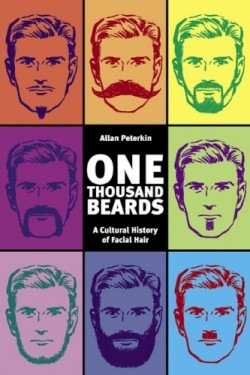One Thousand Beards
A Cultural History of Facial Hair
In France, one of the first famous bearded ladies was Clémentine Delait: Being hirsute from an early age, she simply shaved until she and her husband visited a traveling circus. On spotting an inferior specimen of a hairy gal, she decided to do better; she grew back her beard and joined the touring troupe.
This book discusses facial hair in its thousand different sizes and shapes, curls and designs, styles and furry fixations. The author waxes eloquent, and offers illustrations (photographs and drawings) along with anecdotes, facts, quotations from history, and practical advice. His brief but well-researched chapter “A History of the Beard” explains that in biblical times wars were fought over beards, such as the battle that occurred after one ruler’s ambassadors had their beards half-shorn by the opposing king.
In “Beards of Fame and Infamy,” the author lists renowned people who wore beards, including Jesus, Lincoln, Colonel Sanders, Emperor Julian, Shakespeare, Galileo, and Einstein. Chins and upper lips are remarked upon: Chicago columnist Edith Sessions Tupper criticized a man with goatee or Vandyke as “selfish, sinister, and pompous as a peacock.” In “The Unconscious Beard,” Peterkin talks about hairy villains such as Rasputin, and explores the psychology of beard wearing (Freud had a beard). He provides “A Timeline of Queer Facial Hair,” from Sophocles to Edward II, in “The Gay Beard.”
The story of an entrepreneur of ancient Greece who imported professional barber is told in “The Anti-Beard: A History of Shaving.” Upper-class Greek boys did not cut their hair until their beards started to grow, at which point it was sacrificed to Apollo. Greek men were serious about the coif of their beards: they competed to have the most elaborate design, and regarded highly the man with the most talented trim-servant.
This book demonstrates how a beard can be seen as playful or plaintive, powerful or prayerful. “The glory of a face is its beard,” the Talmud says, but a Latin proverb states: “A hairy man is either strong or libidinous.” Although its thoroughness is at times too wordy and tedious, One Thousand Beards is funny, fanciful, and full of facts.
While Peterkin has fun with witty quips from poets, playwrights, philosophers, and theologians through the centuries, he is also quite serious and instructive, especially in the final chapter on how to plan, grow, and groom one’s own beard. He even gives step-by-step advice on how to perform the perfect shave.
Disclosure: This article is not an endorsement, but a review. The publisher of this book provided free copies of the book to have their book reviewed by a professional reviewer. No fee was paid by the publisher for this review. Foreword Reviews only recommends books that we love. Foreword Magazine, Inc. is disclosing this in accordance with the Federal Trade Commission’s 16 CFR, Part 255.

